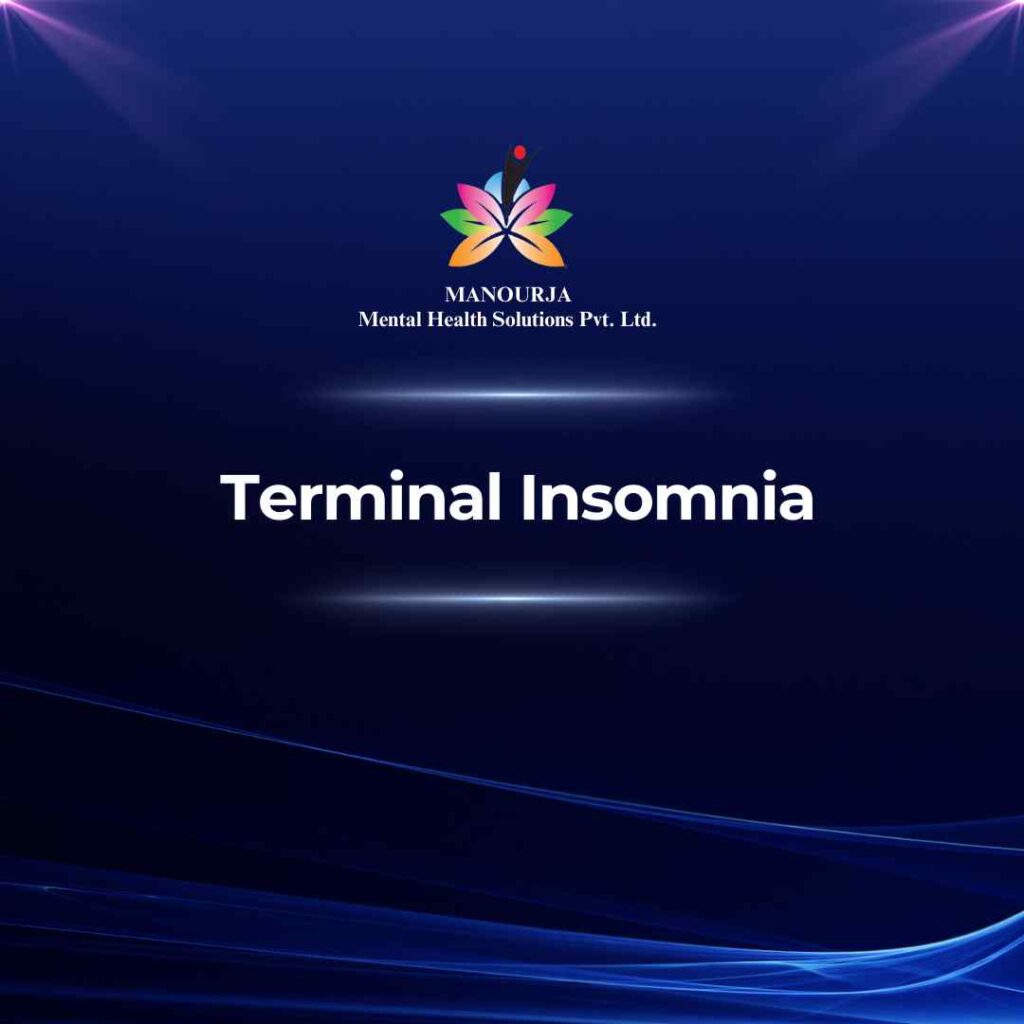Terminal Insomnia

Terminal insomnia, also known as late insomnia or early morning awakening, is a sleep disorder where an individual wakes up earlier than desired and cannot fall back asleep. This results in a shortened sleep duration and often leads to feelings of fatigue, irritability, and difficulty concentrating during the day. Unlike other forms of insomnia, terminal insomnia specifically refers to the difficulty in maintaining sleep until the desired waking time.
Terminal Insomnia as a Sign and Symptom of Mental Illness
As a symptom of mental illness, terminal insomnia indicates disruptions in the sleep-wake cycle often related to underlying psychological or physiological issues. It can be a manifestation of chronic stress, anxiety, or mood disturbances that prevent the individual from achieving restful and continuous sleep. The early awakening and inability to return to sleep can exacerbate other symptoms of mental illness, contributing to a cycle of worsening health.
Mental Illnesses with Terminal Insomnia as a Symptom
- Major Depressive Disorder: Terminal insomnia is a common symptom of major depressive disorder. Individuals with depression often wake up in the early hours and are unable to go back to sleep, which can worsen their depressive symptoms and fatigue.
- Anxiety Disorders: Generalized anxiety disorder, panic disorder, and other anxiety-related conditions can lead to terminal insomnia. Persistent worry and hyperarousal can cause early morning awakenings and difficulty returning to sleep.
- Bipolar Disorder: During depressive episodes of bipolar disorder, individuals may experience terminal insomnia. Conversely, during manic or hypomanic episodes, they may have reduced need for sleep but still experience disrupted sleep patterns.
- Post-Traumatic Stress Disorder (PTSD): PTSD can cause terminal insomnia due to hypervigilance and nightmares. Individuals may wake up early as a result of distressing dreams or a heightened state of alertness.
- Dysthymia (Persistent Depressive Disorder): Similar to major depression, dysthymia can involve chronic sleep disturbances, including terminal insomnia, as part of its long-term low-grade depressive symptoms.
- Substance Use Disorders: Alcohol and other substances can disrupt sleep architecture, leading to terminal insomnia. Withdrawal from certain substances can also contribute to early morning awakenings.
Managing and Treating Terminal Insomnia
Addressing terminal insomnia involves treating the underlying mental health condition and improving sleep hygiene. Strategies include:
- Psychotherapy: Cognitive-behavioral therapy (CBT) for insomnia (CBT-I) helps individuals identify and modify behaviors and thoughts contributing to sleep problems. Therapy for depression, anxiety, or PTSD can also alleviate sleep disturbances.
- Medication: Antidepressants, anti-anxiety medications, or other appropriate psychotropic drugs can help manage the symptoms of the underlying mental illness, thereby improving sleep.
- Sleep Hygiene: Establishing a consistent sleep routine, creating a comfortable sleep environment, and avoiding stimulants like caffeine and electronic devices before bedtime can promote better sleep.
- Relaxation Techniques: Practices such as mindfulness meditation, progressive muscle relaxation, and deep breathing exercises can help reduce stress and anxiety, facilitating better sleep.
- Lifestyle Changes: Regular physical activity, balanced diet, and stress management techniques can support overall mental health and improve sleep quality.
- Addressing Substance Use: Reducing or eliminating the use of alcohol, nicotine, and other substances that interfere with sleep can be crucial for those experiencing terminal insomnia.
Early identification and comprehensive treatment of terminal insomnia are essential for improving both sleep and overall mental health.
At MANOURJA, we believe in the transformative power of counseling. Our experienced therapists offer a safe and supportive space where you can explore your thoughts, emotions, and challenges. Through personalized counselling sessions, we’ll work together to develop coping strategies, build resilience, and achieve lasting positive change. Discover the path to a healthier, happier you with MANOURJA counselling services.
MANOURJA Rehabilitation Services
At MANOURJA, we’re dedicated to helping you in rebuild your life, after difficult times. Our rehabilitation services focus on understanding what you need to move forward, whether you’re recovering from addiction, trauma, or any psychological – social challenges. We create personalized plans, that are all about helping you, regain your strength and find hope again. With a caring team by your side, you’ll have the support to make real progress and take steps toward a brighter, healthier future.
